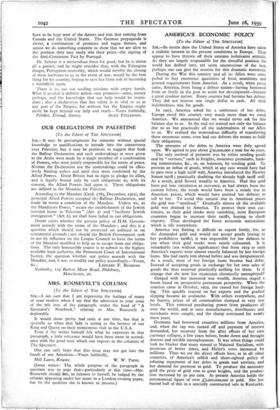OUR OBLIGATIONS IN PALESTINE [To the Editor of THE SPECTATOR]
SIR,—It may be presumptuous for someone without special knowledge or qualifications to intrude into the controversy over Palestine, but it may be pertinent to suggest that both the Balfour Declaration and such undertakings as were given
to the Arabs were made by a single member of a combination of Powers, who were jointly responsible for the terms of peace. Neither the Declaration nor the undertakings could be effec- tively binding unless and until they were confirmed by the Allied Powers. Great Britain had no right to pledge its allies, and is legally bound only by such obligations as, with its consent, the Allied Powers laid upon it. These obligations are defined in the Mandate for Palestine.
According to the Mandate (Cmd. 1785, December, 1922), the principal Allied Powers accepted the Balfour Declaration, and made its terms a condition of the Mandate. Unless we, as the Mandatory Power, " secure the establishment of the Jewish national home in Palestine " (Art. 2) and " facilitate Jewish immigration " (Art. 6), we shall have failed in our obligations.
Doubt exists whether the present policy of H.M. Govern- ment accords with the terms of the Mandate ; and this is a question which should not be answered on political or on sentimental grounds ; nor should the British Government seek to use its influence on the League Council to have the terms of the Mandate modified to help us to escape from our obliga- tions. The only honourable course is to submit to the highest available legal authority, the Permanent Court of International Justice, the question whether our policy accords with the Mandate, and, if not, to modify our policy accordingly.—Yours,
&c., LEONARD F. BEHRENS. Netherby, 119 Barlow Moor Road, Didsbury, Manchester, 20.






















































 Previous page
Previous page